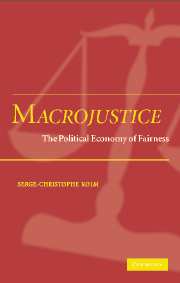Book contents
- Frontmatter
- Contents
- Presentation
- PART ONE BASES: CONSENSUS, FREEDOMS, AND CAPACITIES
- PART TWO OVERALL DISTRIBUTIVE JUSTICE: ELIE (EQUAL LABOUR INCOME EQUALIZATION)
- PART THREE COMPARISONS WITH POLICIES AND PHILOSOPHIES
- PART FOUR THE DEGREE OF COMMUNITY, EQUALITY, RECIPROCITY, AND SOLIDARITY
- PART FIVE COMPARISON WITH ECONOMICS' SOCIAL ETHICS
- 22 Related economic values
- 23 The structure and substance of distributive principles
- 24 Freedom and happiness
- 25 Freedoms, responsibility, desert, merit, equality of opportunity, capacities, capabilities, basic needs
- 26 The theory of equivalence
- 27 Conclusion
- References and bibliography
- Index
24 - Freedom and happiness
Published online by Cambridge University Press: 31 July 2009
- Frontmatter
- Contents
- Presentation
- PART ONE BASES: CONSENSUS, FREEDOMS, AND CAPACITIES
- PART TWO OVERALL DISTRIBUTIVE JUSTICE: ELIE (EQUAL LABOUR INCOME EQUALIZATION)
- PART THREE COMPARISONS WITH POLICIES AND PHILOSOPHIES
- PART FOUR THE DEGREE OF COMMUNITY, EQUALITY, RECIPROCITY, AND SOLIDARITY
- PART FIVE COMPARISON WITH ECONOMICS' SOCIAL ETHICS
- 22 Related economic values
- 23 The structure and substance of distributive principles
- 24 Freedom and happiness
- 25 Freedoms, responsibility, desert, merit, equality of opportunity, capacities, capabilities, basic needs
- 26 The theory of equivalence
- 27 Conclusion
- References and bibliography
- Index
Summary
PRESENTATION: TWO POLAR VALUES AND INTERMEDIATE ONES
Chapter 23 emphasized the general structural properties of distributive principles. The present chapter focuses on issues concerning their “substance,” their material, or their basic concern. For individualistic principles, this material belongs to one of two broad families: freedom and possibilities, on the one hand, and happiness, satisfaction, or just preference, on the other hand. Both have held a central place in the normative side of economics for centuries, and, on the whole, freedom, with liberalism, has probably been the most important. Freedom is directly relevant – and, indeed, essential – for macrojustice. It has thus been discussed in Part I of this study for this application, and more broadly in Chapter 22 for comparison with various brands of economic thought. The present chapter is thus restricted, for both fields, to briefly pointing out the main applications, and to discussions of critical points, notably the interpersonal comparisons of freedom and of happiness that are, by logical necessity, required by the corresponding principles.
Indeed, we have seen that principles of justice require the interpersonal comparability of their basic concerns, whether they are the items or their variations, by logical necessity. Equality across individuals has to be considered across states for defining the basic property of nondiscernable permutations, in the same state for defining the ideal equality, and in comparing various states when differences in individual items across states are relevant.
- Type
- Chapter
- Information
- MacrojusticeThe Political Economy of Fairness, pp. 417 - 437Publisher: Cambridge University PressPrint publication year: 2004



